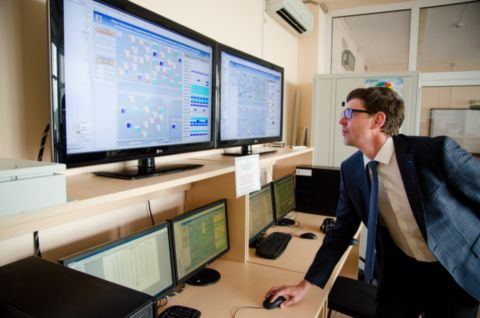The scientists of South Ural State University are improving the energy efficiency of Magnitogorsk Iron & Steel Works power plants by introducing smart technology. These systems work using the Internet of Things: information from hundreds of smart sensors enters the system and is processed online, which will prevent energy waste and equipment breakdown. The project is part of the Ural Interregional Scientific and Educational Center work.
Digital sensors enhance energy efficiency
A group of scientists from South Ural State University lead by Dr. Sc., Professor, and the scientific advisor of the group of mathematical modeling and advanced analytics of PJSC MMK, Dmitry Schneider, is working on automated system of power units’ digital twins. The project partners are MSTU LLC, United Service Company LLC, and the Center for Energy Saving Technologies of PJSC Magnitogorsk Iron and Steel Works.
Scientists have already created an optimization technical and economic model of the station. The model can carry out a comprehensive calculation of the ultimate load distribution between power units. In an automated advisor mode, it can choose the load of the station as a whole. This model checks the current technological limitations and equipment condition. It will also account for the cost of consumed energy resources and generated energy products.
The energy parameters of power generators are taken into account to solve this complex optimization problem. They can change over time due to heat and power processes, natural aging of equipment, and a number of external factors.
To determine the energy characteristics of turbine units, one of the main parameters is steam consumption. However, it is not possible to install instruments for measuring this parameter. To solve this problem, the scientists have created and successfully implemented an algorithm for assessing this value based on a dynamic balance model.
This algorithm includes the parameters of the flow rate and temperature of steam and condensate. It also accounts for the water feed of the turbine equipment and the steam pressure on the turbine. The organization of data transmission in real-life conditions is hard to implement, moreover in some cases, it is impossible. To solve this complex optimization problem, the scientists applied a new technology of the Industrial Internet of Things (IIoT) using wireless temperature and pressure sensors.
An automated system of digital twins for MMK
The scientists have concluded that the specifications of MMK's power plants do not yet allow the introduction and use of systems for dynamic control and assessment of the equipment condition. Thus, it became necessary to create an automated system of turbine units digital twins based on modern solutions of the industrial Internet of things (IIoT) and physical processes modeling.
“The system we develop consists of several subsystems: a subsystem for collecting technological parameters, a subsystem for online monitoring of energy characteristics and condition of the power unit, a subsystem for continuous monitoring of the vibration state, a subsystem for integrating data into external automated enterprise management systems. The digital twins' operation is based on technological and diagnostic parameters from a wireless network of pressure and temperature sensors. The system gets data from a stationary vibration diagnostic system and automated information and control systems. Reading from 25 to 100 parameters is provided for one power unit, depending on its type”, - Dmitry Schneider, the project manager, explains.
To improve the economic efficiency of the power plants and the reliability of equipment operation, the enterprise needs the system of digital twins. It will also reduce unplanned downtime.
Digital technologies and their advantages
An automated system of digital twins is able to determine the current values of the energy indicators. It will help to identify the places where additional costs of energy resources arise. The system will also provide the subsequent analysis of their occurrence and clarify the energy characteristics of power units according to the actual operation data, taking into account their state, conditions, and operating modes. The engineers will be able to determine the current estimate of heat consumption for district heating individually for each turbine generator based on a dynamic balance model or to estimate the actual efficiency of a steam boiler in real time.
South Ural State University performs the functions of the regional project office of the Ural interregional scientific and educational center “Advanced production technologies and materials”. SUSU is a university of digital transformations, where innovative research is carried out in most of the priority areas of science and technology development. Following the strategy of scientific and technological development of the Russian Federation, the university is focused on large scientific interdisciplinary projects in the digital industry, materials science, and ecology. In the Year of Science and Technology, SUSU takes part in the competition under the Priority-2030 program.




